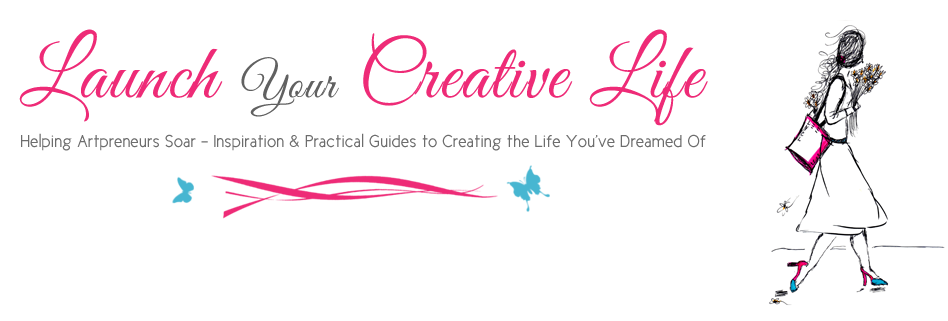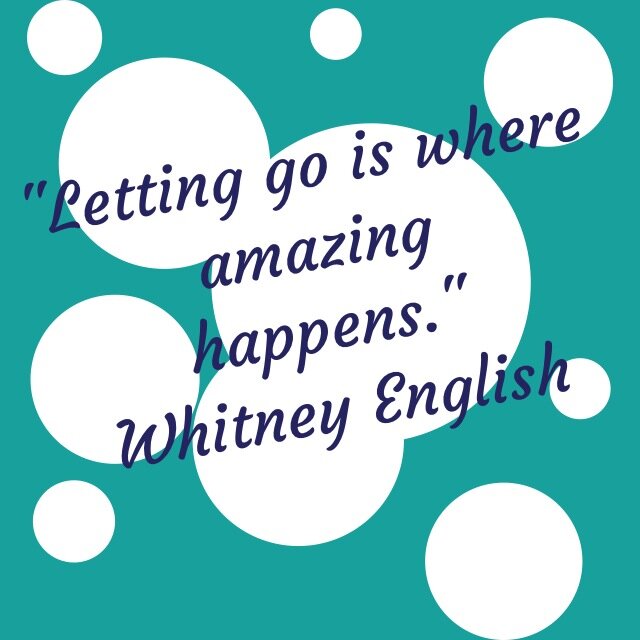
Despite the variety of things we do, we creatives have more than a few common tendencies. See if you identify yourself in the following:
First, creative people have more ideas than they know what to do with. If you tend to write down ideas (so as not to lose them) there are probably sticky notes, index cards and napkins with scribbles on them scattered around the house.
Second, we tend to have a hard time finishing things.
Third, we creatives get frustrated by a lack of progress or the sense of a lack of time to finish projects.
As a rule, creatives have no problem starting something. There is so much to explore, discover, create and do.
But this can also be the death of us. By starting so much, there is a tendency to finish slowly or not at all. This gets frustrating very quickly.
Note: finishing is really, really fun. Reflect back on a personal or professional project that you finished. Whether it was painting and re-decorating a room, sending out handwritten letters to family and friends, writing a book, or getting a website up and running, finishing projects feels good. Really good.
Which is the reason for this post- finishing feels so good I would like to do more of it.
You too?
Implementing a few, simple practices of organization can move us from unhappy, unfinished creative to a goal-achieving, momentum building artpreneur. Here's how.
Identify the Most Important Project
We've all heard it a thousand times but it is true: identifying priorities and making sure our actions align with them is important.
If you are a crafter, blogger, or designer, this is a good time of year to prioritize projects by season. Christmas is coming; projects and inventory for the holidays should be in full throttle production or finishing up in the next month. (I'd like to say all of us are already done with these projects and plans but I know better!)
For anything fall or Halloween, now is the time to finish, share these projects, ideas and writings with the community and get ready for the next season.
If there are several projects you view as valuable, how do you qualify which gets your priority? Everyone has their own seasonal priorities. Maybe the priority for this season is creating income or building a solid foundation for a business.
Make sure the activities of the day are spent on what YOU deem as the priorities.
What qualifies as a valuable day? Only you can decide.
Author and speaker Joanna Penn measures her productivity by one thing. On her wall, above her desk, she has a sign: It reads: "Did you make art today?"
The what doesn't matter as much as that she made art. She is a independent author who self publishes her books and teaches others how to the same. Joanna has studied the book market for several years and knows the best way to enjoy continual success is to keep writing books her audience enjoys (religious, edgy thrillers). Therefore, the most important activity she can do is to keep writing, keep making her art.
Take Advantage of the Mornings
It's not about being a morning or night person- it is about the state of mind we are in when we arise.
Some of you may argue that the state of mind morning brings is nothing you want to talk about. Hear me out.
In the morning, we awake to a new day. Yesterday is gone along with the feelings and emotions. Today is new. Physiologically, the rest received during the night is working. The brain has been busy problem solving, resting and renewing itself. There is not the bombardment of outward stimuli or distractions.
Take a few days a week and don't start with television or email. Instead, work on a project. As a creative you want to harness the fresh thoughts. Insert creative time here. Write down thoughts, a blog post, sketch images, start painting.
If you haven't tried working on projects first thing in the morning, I encourage you to do it for a week. Get up before the kids. Get up an extra half hour before work so you can be creative. Do that a few times a week (or 5 days) and soon projects will start coming together.
One marketer writes all of his books in the morning. He gets up and writes for an hour nearly every day before he starts his day job as a business consultant. He's done this for decades. How many books has he written? A lot! More than 20.
This is what organization does for us. Organizing our time in blocks of creative work gets stuff done. It doesn't happen in a day or a week or even longer. But in the course of time, just watch your productivity grow!
Life consists of the repetitive movements making us stronger and more creative every.
Batch Projects
Focusing on one thing at a time improves our productivity. Instead of working one recipe at a time for the baking blog, I've learned I am much more productive when I batch projects.
I may work through several baking projects over the course of one or two days, testing recipes and taking pictures. Next, I will spend a few hours one day writing several posts.
At night, when my creative energy is at its lower point, I edit pictures and put the blog posts together, scheduling them out over the course of the month. This activity takes less of my brain power and is easier to do at night while I put on some music and sip on hot tea.
Pay Attention to Energy Dips and Rises
Some days I'm tempted to jump into the photo editing or blog updating first thing in the morning. But that work doesn't require the focus and concentration writing requires of me. I know that to have a productive day I need to start with writing in the morning.
Studies show we only have a certain amount of focus. We literally use up our self-will during the day. This may be why it is harder to do more work at night. We've been trying to focus all day!
Be kind to yourself if you feel tired at night. Save the night work for going through email, editing posts, updating social media, etc. I make it a rule not to look at email or social media until my morning ritual activities are done. Then I give myself the "break" to do the less intense tasks.
Additionally, at night there is a very limited timeframe to work (if I want to get a decent night's sleep). Therefore I don't have several hours to go through Facebook updates, editing, research and email. I've got to be quick and move through the tasks.
When You're There; Be All There
When was the last time you were spending time with friends but your mind rotated back to a project you were working on. Or, it was family time but the laptop was out as you tried to interact with family and finish a project.
It doesn't work very well, does it? It's frustrating for us and its hard for those we are with.
Organizing my priorities means organizing my time. I am learning that when I'm somewhere, to "be all there." (quote by Jim Elliot).
This means not feeling guilty- either about working when I should be with someone or feeling guilty about being with friends when I should be working. I work for an allotted period of time and then I call it a day. I allow time for night work- photo editing, social media interaction, planning for the next day, writing for an upcoming deadline- and other nights for family and friend time.
Studies have been done regarding the efficiency of working for hours on end. According to research, we start to lose our productivity after so many hours (the experts disagree on the amount). The brain can only work so hard without a break.
Regret, distraction, and guilt are monsters I hate dealing with. These monsters inhibit creativity.
I work better when I've played well. I play well when I've worked hard. Even when I love my work I still need a rest. So do you.
If your creative work tends to make you a "work-a-holic," black out dates on the calendar and call them "work free zones."
Give yourself a break. In the scheme of things, the extra 3 hours is not going to make or break your project, deadline or style. And, this is a wonderful time of year to stop and celebrate beauty, family and friends.
Special memories can be made with intentional 3 hours spent with family and friends. Organize people time into your life. It's what adds lots color and joy.
Plus you'll return to work refreshed and invigorated.
Conclusion- The Point of all this
The point of organization is to add more to your day and to your life, not take away from it. Do I follow a schedule every single day? Nope.
I take one day off from working on creative stuff every week. Some of the other days I do things in a different order to keep life fresh and vibrant.
The art of organization can be applied to all parts of our lives: From exercise to cleaning the house to interacting on social media. A little organization of our time and priorities can go a long way.
Julie Andrews says, "Some people consider discipline a chore. For me it is an order that sets me free to fly."
I think we could insert "organization" where discipline is with an equally effective meaning.
Have you found secrets to getting more done (even with a bunch of different projects going on?) Please share in the comments!







Leave a Comment